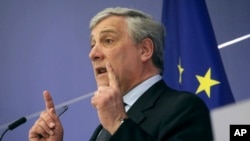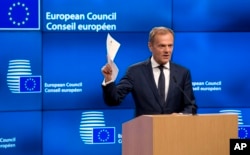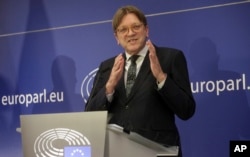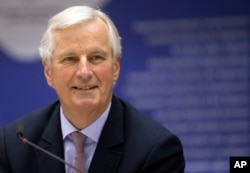The European Parliament wants the rights of Europeans in Britain and of British citizens in Europe to get top priority in Brexit talks.
European Parliament President Antonio Tajani told journalists Wednesday the parliament's main task is to defend the rights of citizens.
“Not reaching a deal on rights of citizens means not reaching a deal at all.”
Members of the European Parliament want citizens rights to be discussed at the beginning, fearing their rights could otherwise be used as bargaining chips during the negotiations.
Letter Triggers Article 50
Britain delivered a letter to the European Union Wednesday triggering Article 50 — the official withdrawal from the European Union. The European Parliament has the right to veto any final deal.
A draft resolution on Brexit by members of the European Parliament will be discussed next week, and already has the support of a large majority. Besides citizen's rights, the draft resolution warns Britain it cannot start bilateral agreements with other countries or member states. The draft also proposes a maximum transitional period of three years, including for the European Court of Justice.
While British Prime Minister Theresa May's letter focuses a lot on security, the draft resolution states “ … whatever the outcome of negotiations on the future of European-United Kingdom relationship, they cannot involve any trade-off between internal and external security including defense cooperation, on the one hand, and the future economic relationship, on the other hand,” said May.
Irish border a concern
Guy Verhofstadt, Brexit-coordinator on behalf of the European Parliament, voiced the parliament's objection to any radical changes at the Irish border.
“The Brexit agreement needs to fully respect the Good Friday agreement in all its aspects and that means also we will never accept a harder border again between Northern Ireland and the Irish Republic,” he said.
Britain delivered the withdrawal letter Wednesday to EU Council President Donald Tusk in Brussels. The letter, written and signed by Prime Minister May, spoke of the “deep and special partnership” with the European Union. May told the British Parliament leaving the European Union is an “historic moment, from which there can be no turning back.”
Tusk accepted the letter and will notify the remaining 27 EU leaders within 48 hours to present negotiation guidelines. He will also host an EU leaders summit on April 29 to discuss Brexit and the two-year separation process. After receiving the letter, Tusk said about the British “we already miss you” while also finding something positive in Brexit.
“Brexit has made us, the community of 27, more determined and more united than before. … Both I and the commission have a strong mandate to protect the interests of the 27. … In essence, this is about damage control. Our goal is clear, to minimize the costs for the EU citizens, businesses and member states.”
Divorce bill
There are several important points of disagreement that need to be settled. One of them is the so-called divorce bill, which is said to be tens of billions of dollars. Before Britain can leave the bloc, it will have to pay its outstanding bills.
The EU chief negotiator Michel Barnier reiterated last week that all countries must honor their commitments.
“Let me be clear, when a country leaves the union, there is no punishment, there is no price to leave. But we must settle the accounts, no more, no less,” Barnier said.
Another issue is that the European Union has said the first focus should be on how to separate, and only then discussions on a future relationship can begin. May's letter stresses it is necessary “to agree [to] the terms of our future partnership alongside those of our withdrawal from the EU.”







